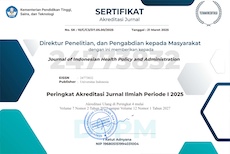Abstract
Gestational Diabetes Mellitus (GDM) is a health condition that increases during pregnancy and can lead to serious complications for both the mother and the fetus. Self-management, encompassing understanding, implementing, and maintaining health behaviors, is crucial in managing GDM. The Health Belief Model (HBM) is a theoretical framework that can serve as the basis for interventions to enhance self-efficacy in pregnant women with GDM. This study analyzes the relationship between self-efficacy and self-management in controlling gestational diabetes in pregnant women. It is a literature review using a literature search method. Literature searches were conducted through three databases: PubMed, Scopus, and Google Scholar, covering articles published between 2014 and 2024. The search utilized MeSH keywords such as "Gestational Diabetes Mellitus," "Self-Efficacy," and "Intervention Self-Management." The search yielded seven English articles that met the inclusion criteria. Analysis was conducted narratively, referring to the identified literature findings. Literature review findings indicate a positive correlation between the implementation of Health Belief Model-based self-management and the improvement of self-efficacy in pregnant women with gestational diabetes. Factors such as risk understanding, perception of benefits, and understanding of barriers are crucial in influencing self-efficacy levels. Applying the HBM contributes to enhancing the ability of pregnant women to engage in self-management. This intervention effectively boosts the confidence of pregnant women in managing dietary patterns, physical activity, and blood glucose monitoring, assisting them in coping with gestational diabetes.
References
- Soelistijo SA, Lindarto D, Decroli E, Permana H, Sucipto KW, Kusnadi Y, et al. Pengelolaan Dan Pencegahan Diabetes Melitus Tipe 2 Dewasa di Indonesia. PERKENI. 2019. 133 p.
- Rahayu A, Rodiani R. Efek Diabetes Melitus Gestasional terhadap Kelahiran Bayi Makrosomia. J Major. 2016;5(4):17–22.
- Pheiffer C, Dias S, Adam S. Intimate partner violence: a risk factor for gestational diabetes. Int J Environ Res Public Health. 2020;17(21):1–17.
- Plows JF, Stanley JL, Baker PN, Reynolds CM, Vickers MH. The pathophysiology of gestational diabetes mellitus. Int J Mol Sci. 2018;19(11):1–21.
- Tol A, Baghbanian A. The introduction of self-management in type 2 diabetes care: A narrative review. J Educ Health Promot. 2012;1(1):35.
- Jafari-Shobeiri M, Ghojazadeh M, Azami-Aghdash S, Naghavi-Behzad M, Piri R, Pourali-Akbar Y, et al. Prevalence and risk factors of gestational diabetes in Iran: A systematic review and meta-analysis. Iran J Public Health. 2015;44(8):1036–44.
- Phelan S, Jelalian E, Coustan D, Caughey AB, Castorino K, Hagobian T, et al. Randomized controlled trial of prepregnancy lifestyle intervention to reduce recurrence of gestational diabetes mellitus. Am J Obstet Gynecol. 2023;229(2):158.e1-158.e14.
- Rojas Pérez LA, Rojas Cruz LA, Villagómez Vega MD, Rojas Cruz AE, Rojas Cruz AE. Risk Factors and Diagnosis of Gestational Diabetes. ESPOCH Congr Ecuadorian J STEAM. 2021;1(6):102–11.
- S Karimy, A Mansouri HSh. The effect of health belief model-based education on adherence to the dietary regimen in pregnant women with gestational diabetes. J Diabetes Nurs. 2016;4:1–9.
- Mohebbi B, Tol A, Sadeghi R, Mohtarami SF, Shamshiri A. Self-management intervention program based on the health belief model (Hbm) among women with gestational diabetes mellitus: A quazi-experimental study. Arch Iran Med. 2019;22(4):168–73.
- Johnson E, DeJonckheere M, Oliverio AL, Brown KS, Van Sparrentak M, Wu JP. A theoretical model of contraceptive decision‐making and behaviour in diabetes: A qualitative application of the Health Belief Model. Diabet Med. 2021;38(6):e14434.
- Stovold E, Beecher D, Foxlee R, Noel-Storr A. Study flow diagrams in Cochrane systematic review updates: an adapted PRISMA flow diagram. Syst Rev. 2014;3:1–5.
- Al-Hashmi I, Hodge F, Nandy K, Thomas E, Brecht ML. The effect of a self-efficacy-enhancing intervention on perceived self-efficacy and actual adherence to healthy behaviours among women with gestational diabetes mellitus. Sultan Qaboos Univ Med J. 2018;18(4):e513–9.
- Jeon YK, Kim HJ, Yang MY, Jung DY, Yoon KY, Noh GO. Effects of a postnatal care program on self-efficacy, self-management, and glycemic control in women with gestational diabetes mellitus. Korean J Women Heal Nurs. 2018;24(4):367–78.
- Ahmed SRH, Salem SG, Saber NM, Abou Elazab RTA, Atia MM. Effectiveness of Nursing Intervention on Health Locus of Control and Self-Efficacy in Women with Gestational Diabetes. Evidence-Based Nurs Res. 2021;3(1):12.
- Kim SH, Kim HJ, Shin G. Self-management mobile virtual reality program for women with gestational diabetes. Int J Environ Res Public Health. 2021;18(4):1–12.
- Farrag RE, Metwely S. Effect of Tele-nursing Services on Healthy Lifestyle and Self-Efficacy among Gestational Diabetes Women. Int J Nov Res Healthc Nurs [Internet]. 2016;3(1):129–40. Available from: www.noveltyjournals.com
- Webber J, Charlton M, Johns N. Diabetes in pregnancy: Management of diabetes and its complications from preconception to the postnatal period (NG3). Br J Diabetes Vasc Dis. 2015;15(3):107–11.
- Sari FYP, Farida S. Penurunan gestasional diabetes mellitus (gdm) di puskesmas kota yogyakarta 1 1. Pros Semin Inf Kesehat Nas. 2024;54–60.
Bahasa Abstract
Diabetes mellitus gestasional (DMG) merupakan kondisi kesehatan yang meningkat dalam kehamilan dan dapat menyebabkan komplikasi serius bagi ibu dan janin. Self-management yang mencakup pemahaman, penerapan, dan pemeliharaan perilaku kesehatan memiliki peran kunci dalam mengelola DMG. Health Belief Model (HBM) digunakan sebagai kerangka kerja teoretis yang membentuk dasar intervensi untuk meningkatkan self-efficacy pada ibu hamil dengan DMG. Studi ini menganalisis hubungan antara efikasi diri dan manajemen diri dalam pengendalian diabetes gestasional pada ibu hamil. Artikel ini adalah tinjauan pustaka dengan menerapkan metode pencarian literatur. Pencarian literatur dilaksanakan melalui tiga basis data yaitu PubMed, Scopus, dan Google Scholar, yang mencakup artikel-artikel yang dipublikasikan dalam rentang waktu 2014-2024. Pencarian menggunakan kata kunci MeSH seperti "Gestational Diabetes Mellitus", "Self-Efficacy" dan "Intervention Self-Management." Hasil pencarian menghasilkan tujuh artikel berbahasa Inggris yang memenuhi kriteria inklusi. Analisis dilakukan secara naratif dengan merujuk pada persamaan temuan dalam literatur yang teridentifikasi. Temuan dalam kajian literatur menunjukkan bahwa terdapat korelasi positif antara implementasi self-management yang didasarkan pada Health Belief Model dengan peningkatan self-efficacy pada ibu hamil yang menderita diabetes gestasional. Faktor-faktor seperti pemahaman risiko, persepsi manfaat, dan pemahaman hambatan; memainkan peran penting dalam memengaruhi tingkat self-efficacy. Penerapan HBM memberikan kontribusi pada peningkatan kemampuan ibu hamil dalam melakukan manajemen diri. Intervensi ini efektif meningkatkan kepercayaan diri ibu hamil dalam mengelola pola makan, aktivitas fisik, dan pemantauan gula darah, membantu mereka mengatasi diabetes gestasional.
Recommended Citation
Cahyani, Fatimah Dwi and Devy, Shrimarti Rukmini
(2025)
"The Relationship between Self-Efficacy and Self-Management Behavior in Gestational Diabetes Mellitus Control,"
Journal of Indonesian Health Policy and Administration: Vol. 10:
No.
1, Article 4.
DOI: 10.7454/ihpa.v10i1.1133
Available at:
https://scholarhub.ui.ac.id/ihpa/vol10/iss1/4
Included in
Health Policy Commons, Nutritional and Metabolic Diseases Commons, Public Health Education and Promotion Commons











